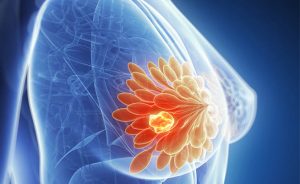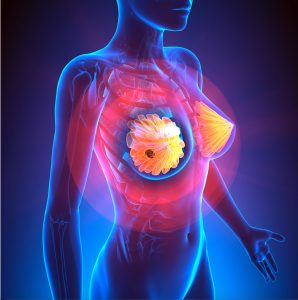ER+/HER2+ Breast Cancer Specimens
Bay Biosciences provides high quality, clinical grade bio-samples, cryogenically preserved breast cancer tumor tissue samples, serum (sera), plasma and peripheral blood mononuclear cells (PBMC) biofluid specimens from patients diagnosed with ER+/HER2+ (Luminal A) Breast cancer. Breast cancer (BC) is the most frequently diagnosed malignancy in women, accounting for approximately 25%of cancer diagnoses and 15% of cancer-related deaths in women, globally.
The PBMC, serum (sera), plasma samples are processed from patient’s peripheral whole-blood using customized processing protocols. The ER+/HER2+ Breast cancer bio-specimens are collected from unique patients affected by cyclin-dependent kinases 4/6 (CDK4/6) positive ER+/HER2+ Breast cancer and are provided to a valued pharmaceutical customer for research, discovery and development. Dysregulated activation of the cyclin-dependent kinases (CDKs) 4/6, leading to uncontrolled cell division, is a distinguishing character of cancers.

Breast Cancer Molecular Types
The most common molecular subset of breast cancer is defined by its ability to respond to the female hormone, estrogen. Genomic research has led to more detailed ways to classify breast cancer, based on their genes and proteins, by dividing them into four main molecular subtypes: HER2, luminal A, luminal B and triple-negative.
Some breast cancers are sensitive to the body’s naturally occurring female hormones, estrogen and progesterone. The breast cancer cells have receptors on the outside of their walls that can catch specific hormones that circulate through the body. Knowing the type of breast cancer which is sensitive to hormones gives a better idea of how best to treat the cancer or prevent cancer from recurring.
HER2-positive
One in five invasive breast cancers is human epidermal growth-factor receptor 2 or HER2-positive, making this one of the more common breast cancer subtypes in the United States. HER2-positive cancers are ER- negative and PR-negative and human epidermal growth factor receptor 2 (HER2+) positive.
Symptoms of HER2-positive breast cancer are similar to those of other breast cancer types. They include a lump in the breast, changes to the breast’s shape, pain, swelling and abnormal discharge.
Depending on the cancer’s stage, treatment options for HER2-positive breast cancer may include a combination of surgery, chemotherapy, radiation therapy, and/or administration of a targeted therapies such as the immune monoclonal antibody, trastuzumab (Herceptin).
Luminal A
Luminal A is the most common subtype for every race and age. These tumors tend to be estrogen receptor (ER+) positive and progesterone receptor (PR+) positive and are typically slow growing. Treatment typically involves hormonal therapy.
Luminal B
Luminal B includes tumors that are estrogen receptor positive, progesterone receptor negative and HER2+ positive. These tumors tend to grow more quickly than luminal A tumors. Luminal B breast cancers are likely to benefit from chemotherapy and may benefit from hormone therapy and treatments targeting the HER2 receptor.
Triple-Negative Breast Cancer (TNBC)
Triple-negative breast cancer is a type of cancer in which the cells do not contain receptors for estrogen (ER-), progesterone (PR-) or HER2-. This type of breast cancer is usually invasive and usually begins in the breast ducts.
Healthy breast cells contain receptors for the hormones Estrogen (ER) and Progesterone (PR). They also contain receptors for a protein called HER2, which stimulates normal cell growth. About two out of three women with breast cancer have cells that contain receptors for estrogen and progesterone, and about 20 percent to 30 percent of breast cancers have too many HER2 receptors.
Breast cancer that is estrogen receptor (ER+) and progesterone receptor (PR+) positive can be treated with hormonal therapy. Breast cancer with excess amounts of HER2 can be treated with anti-HER2 targeted therapy drugs such as trastuzumab.
In women with triple-negative breast cancer, the malignant cells do not contain receptors for estrogen, progesterone or HER2. Breast cancer that is ER-, PR- and HER2– negative cannot be treated with hormonal therapy or medications that work by blocking HER2, such as trastuzumab. Fortunately, triple-negative breast cancer can be treated with other drugs, such as chemotherapy, radiation therapy and non-HER2 targeted therapy.

Hormone status of breast cancers includes:
- Estrogen receptor (ER) positive. The cells of this type of breast cancer have receptors that allow them to use the hormone estrogen to grow. Treatment with anti-estrogen hormone (endocrine) therapy can block the growth of the cancer cells.
- Progesterone receptor (PR) positive. This type of breast cancer is sensitive to progesterone, and the cells have receptors that allow them to use this hormone to grow. Treatment with endocrine therapy blocks the growth of the cancer cells.
- Hormone receptor (HR) negative. This type of cancer doesn’t have hormone receptors, so it won’t be affected by endocrine treatments aimed at blocking hormones in the body.
Researchers understand how the individual DNA changes within cancer cells might be used to determine better treatment options. By analyzing the genes of cancer cells, researchers hope to find ways to target specific aspects of the cancer cells to kill them.
A sample of tumor tissue from a biopsy procedure may be tested in a laboratory to look for:
- HER2 gene– Cancer cells that have too many copies of the HER2 gene (HER2-positive cancers) produce too much of the growth-promoting protein called HER2. Targeted therapies drugs are available to shut down the HER2 protein, thus slowing the growth and killing these cancer cells.
- Other tumor markers- Researchers are studying ways to interpret the genetic makeup of tumor cells. Doctors hope this information can be used to predict which cancers will spread and which may need aggressive treatments. That way, women with relatively low-risk breast cancers may avoid aggressive treatments.
Doctors are increasingly using genetic information about breast cancer cells to categorize breast cancers. These groups help guide decisions about which treatments are best.
Breast cancer groups include:
- Group 1 (Luminal A)- This group includes tumors that are ER positive and PR positive, but negative for HER2. Luminal A breast cancers are likely to benefit from hormonal therapy and may also benefit from chemotherapy.
- Group 2 (Luminal B)- This type includes tumors that are ER positive, PR negative and HER2 positive. Luminal B breast cancers are likely to benefit from chemotherapy and may benefit from hormonal therapy and treatment targeted to HER2.
- Group 3 (HER2 positive)- This type includes tumors that are ER negative and PR negative, but HER2 positive. HER2 breast cancers are likely to benefit from chemotherapy and treatment targeted to HER2.
- Group 4 (Basal-Like)- This type, which is also called triple-negative breast cancer, includes tumors that are ER negative, PR negative and HER2 negative. Basal-like breast cancers are likely to benefit from chemotherapy.
Understanding more about the chemical and genetic makeup of cancer may help doctors choose the most effective treatment for specific cancer.

Bay Biosciences is a global leader in providing researchers with high quality, clinical grade, fully characterized human tissue samples, bio-specimens and human bio-fluid collections from cancer (tumor) tissue, cancer serum, cancer plasma cancer PBMC and human tissue samples from most other therapeutic areas and diseases.
Bay Biosciences maintains and manages it’s own bio-repository, human tissue bank (biobank) consisting of thousands of diseased samples (specimens) and from normal healthy donors available in all formats and types. Our biobank procures and stores fully consented, deidentified and institutional review boards (IRB) approved human tissue samples and matched controls.
All our human human tissue collections, human specimens and human bio-fluids are provided with detailed samples associated patient’s clinical data. This critical patient’s clinical data includes information relating to their past and current disease, treatment history, lifestyle choices, biomarkers and genetic information. Patient’s data is extremely valuable for researchers and is used to help identify new effective treatments (drug discovery & development) in oncology, other therapeutic areas and diseases. This clinical information is critical to demonstrate their impact, monitor the safety of medicines, testing & diagnostics, and generate new knowledge about the causes of disease and illness.
Bay Biosciences banks wide variety of human tissue samples and biological samples including cryogenically preserved -80°C, fresh, fresh frozen tissue samples, tumor tissue samples, FFPE’s, tissue slides, with matching human bio-fluids, whole blood and blood derived products such as serum, plasma and PBMC’s.
Bay Biosciences is a global leader in collecting and providing human tissue samples according to the researchers specified requirements and customized, tailor made collection protocols. Please contact us anytime to discuss your special research projects and customized human tissue sample requirements.
Bay Biosciences provides human tissue samples (human specimens) from diseased and normal healthy donors; including peripheral whole-blood, amniotic fluid, bronchoalveolar lavage fluid (BAL), sputum, pleural effusion, cerebrospinal fluid (CSF), serum (sera), plasma, peripheral blood mononuclear cells (PBMC’s), saliva, Buffy coat, urine, stool samples, aqueous humor, vitreous humor, kidney stones, renal calculi, nephrolithiasis, urolithiasis and other bodily fluids from most diseases including cancer. We can also procure most human bio-specimens and can do special collections and requests of human samples that are difficult to find. All our human tissue samples are procured through IRB approved clinical protocols and procedures.
In addition to the standard processing protocols Bay Biosciences can also provide human plasma, serum, PBMC bio-fluid samples using custom processing protocols, you can buy donor specific sample collections in higher volumes and specified sample aliquoting from us. Bay Biosciences also provides human samples from normal healthy donors, volunteers, for controls and clinical research, contact us Now.
日本のお客様は、ベイバイオサイエンスジャパンBay Biosciences Japanまたはhttp://baybiosciences-jp.com/contact/までご連絡ください。


